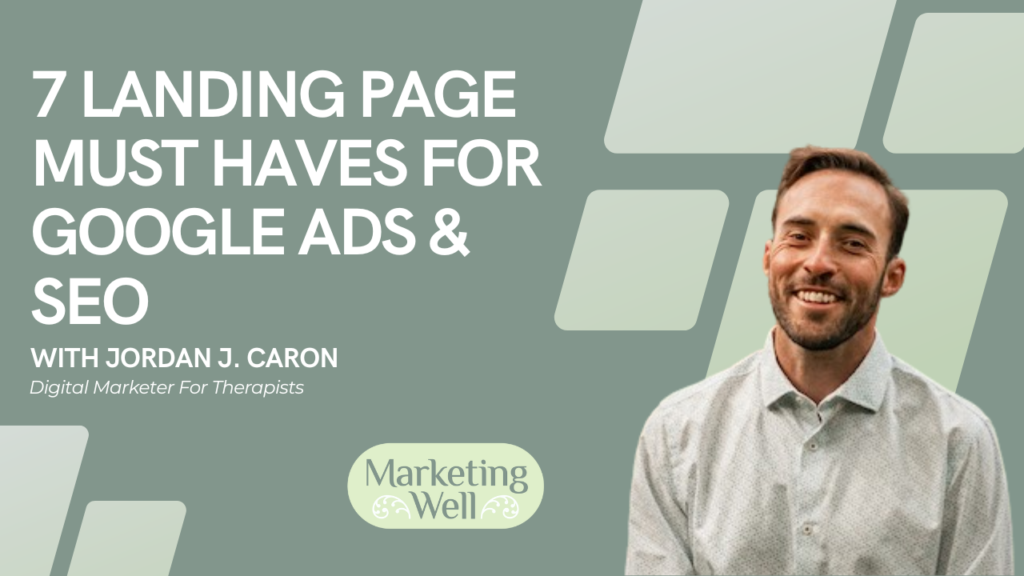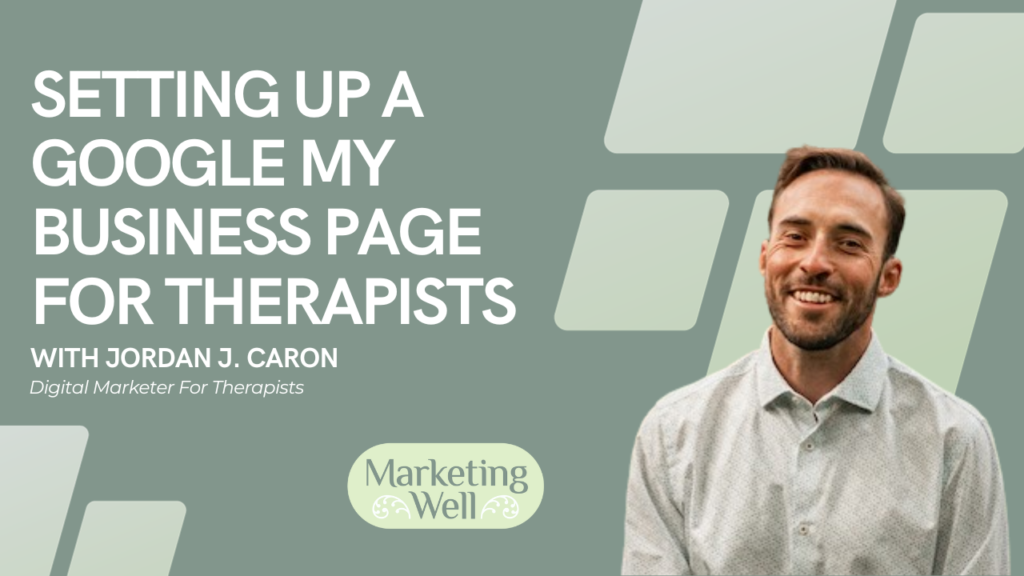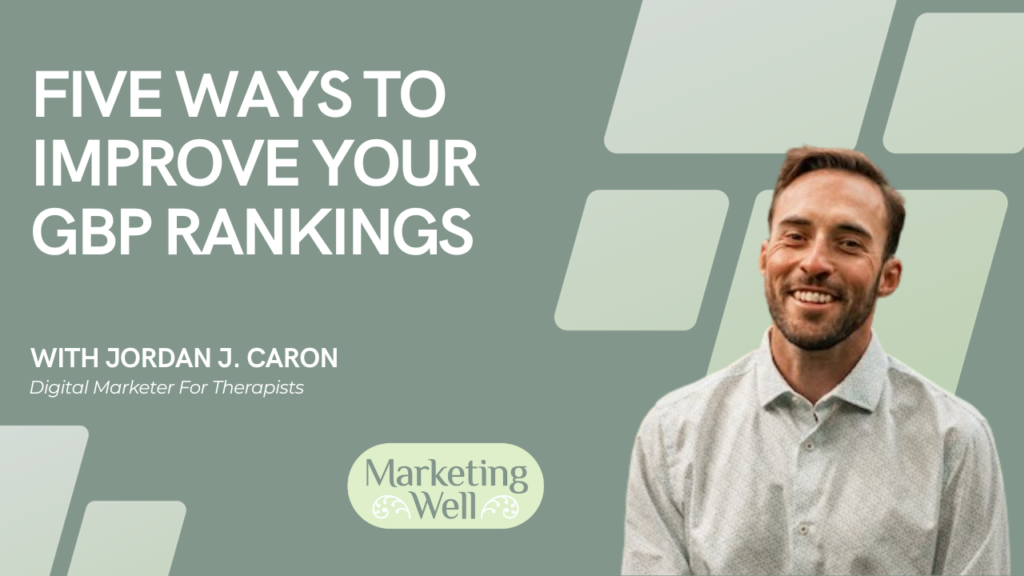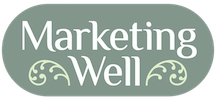Before I discuss what you must have on your landing page, let me first explain what a landing page is.
A landing page is a specific page on your website that you are driving traffic to through an advertisement or a keyword search on a search engine.
Understanding the concept of a landing page can be challenging, but let’s make it more relatable. Imagine you’re a therapist specializing in couples counselling. You want to attract more clients, so you decide to run a Google or Facebook ad. To maximize the impact of your ad, you create a specific page on your website, just like this example from Open Space in Vancouver.
I have already written about this when I talked about crafting web pages to target specific mental health issues or specific areas of therapy and counselling.
The idea is to give a person a landing page how you help couples through therapy. You will need to duplicate this idea for all the other areas you help people with, like:
- depression
- anxiety
- trauma
- grief
- EMDR
- CBT
- IFS
For the sake of this blog, I will keep the examples focused on couples therapy. Now, let me get into the seven must-haves for this landing page, regardless of whether you want to set it up for SEO and Google Ads success. They are:
- compelling headline and primary keywords
- ask questions they’ll agree with
- your offer in the form of a call to action which could be a free 15-minute consultation
- FAQ section to reduce everyones time
- your picture and biography to build a connection with the visitor
- testimonials will build trust and credibility
- your experience and training to further build trust and credibility
Compelling Headline
When someone clicks on your landing page from a Google Ad or organic search, they look for exactly what you promised. For example, if your ad highlights “Couples Therapy in [Location],” your landing page headline should directly reflect this promise. This consistency reassures visitors that they’re in the right place, building trust from the start with the searcher and the search engine.
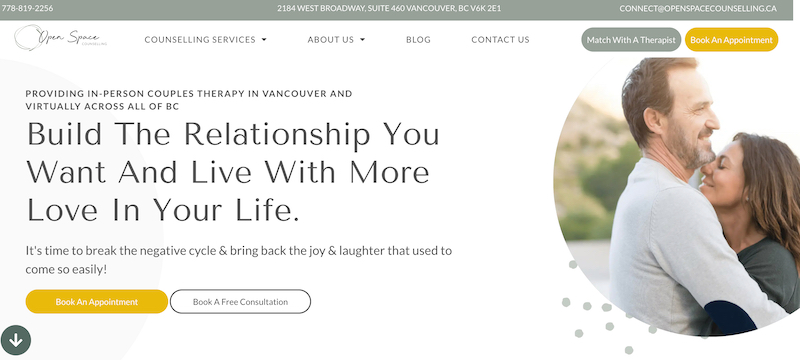
You can see the example from Open Space that they have “Providing In-Person Couples Therapy in Vancouver…”. This is perfect as the visitor knows right away they are in the right place for couples therapy in Vancouver. Using consistent, relevant language and themes in the ad and the headline can significantly enhance the user experience and boost your conversion rates.
Location-Specific Messaging
Adding location details in your Google Ads and landing page headlines adds a personal touch and makes your message more relevant. This will also help with SEO for therapists, especially when you have completed this easy yet most important SEO factor for therapists. It shows visitors that you not only offer the service they need but are also conveniently located. Including these elements at the top of your landing pages tied to your ads and SEO can greatly enhance your conversions and also benefit your SEO.
By ensuring your ad promises align with your landing page headlines and incorporating location-specific messaging, you can create a seamless and engaging experience that encourages visitors to take action.
Ask Questions
The visitor is on their website looking for a solution to their problem. Write the first text section about that problem and what they might be feeling at this moment. Touch on the pain points of what they might be feeling to stir up the emotion so that they will finally take action and book a session with you.
I like the idea of asking the visitor three questions they’ll most likely agree to. When it comes to a person seeking out couples therapy, there could be many reasons why they are looking for a therapist. You could ask questions like:
- Do you need to know if your partner is being truthful with you?
- Are you looking to rekindle the intimacy in your relationship?
- Are you trying to improve the communication in your relationship?
The visitor will likely be on your page for these reasons. From there, you write about your approach to couples therapy and how you can help.
The visitor will most likely be on your page for these reasons. From there, you write about your approach to couples therapy and how you can help.
List Your Offer & Call To Action
Before you want them to take action, you should list your offer. Every therapist offers the same sort of free consultation. Whatever that is, you want to mention that right away. Therapy costs money, and people want to get a feel for you before they agree to pay for the sessions.

Whatever your offer, make the call-to-action text consistent across your website. The above example guides people with some text before asking them to book a session or free consultation. The only thing I would prefer to avoid is having two buttons to book a session and a free consultation side by side. If not many people book a paid session before a free consultation, have a free consultation button to avoid confusion or an extra decision.
Try and scatter a few call to actions on your page. Often times therapists don’t want to be too salesy or pushy and they only have a call to action listed once. But you want to take advantage of this person being on our site this once because it will most likely be your only chance. So guide them to book a free consultation by mentioning it a few times of a landing page.
FAQ Section
This area can be used to reduce everyones time. It might take you some time for you to create but it will save everyone time in the long run.
Simply think about all the common questions you get asked. Then answer them in this section.
Transparency about the therapy process can demystify it for newcomers and help them feel more prepared and less anxious about reaching out. Here are some critical pieces of information to include on your landing page:
- Session Lengths: Clearly state how long each session typically lasts. For example, “Our therapy sessions are 50 minutes long, providing ample time to explore your concerns and work on solutions.”
- Insurance Acceptance: Include insurance information. For instance, “We accept most major insurance plans, including [specific insurance providers]. If you’re unsure about your coverage, our friendly staff can help you navigate the details.”
- First Session Expectations: Outline what new clients can expect in their first few sessions. For example, “In your initial session, we will discuss your goals and create a personalized treatment plan. The first few sessions are designed to help us get to know you and understand your needs.”
By including this practical information, you help potential clients feel more informed and comfortable with the process, making them more likely to book an appointment. When they do, they will have read this section and want to meet or setup a call to test simply to test compatibility which will increase the likelihood they sign up for paid sessions.
Your Picture & Biography
You must likely have this on your about page, but instead of making the user click over to your about page, add your picture and biography to your landing page. This is another step in building trust with the visitor. You will also build a connection with them well before you have met for a consultation. Bonus points if you already have professional photographs that create a warm and welcoming feeling.

Testimonials
I understand that you most likely are not able to solicit for reviews. I am hopeful that people have sent you emails mentioning how helpful you have been. If they have, I would ask that you kindly ask them if you can display the testimonial on your website as it will help others from potentially experience similar benefits.
Personal stories of growth, recovery, and satisfaction can be powerful tools for attracting new clients. It can also inspire them. These testimonials provide relatable and compelling reasons for potential clients to choose your practice. Here’s how to effectively present them:
- Growth and Recovery Stories: Share testimonials that detail clients’ journeys from struggle to recovery. For example, a testimonial might say, “After months of feeling lost, I found my way with the help of this practice. The tailored therapy sessions gave me the tools to manage my anxiety and reclaim my life.”
- Comfortable Environment: Highlight how your practice provides a safe and relaxed environment. For instance, “The calming atmosphere of the therapy rooms and the warm welcome from the receptionist always put me at ease. It’s a place where I feel safe to open up and heal.”
- Therapeutic Outcomes: Share specific outcomes clients have achieved through therapy. A testimonial might read, “Thanks to the expert guidance of my therapist, I’ve been able to overcome my depression and build a healthier mindset. The techniques I’ve learned here continue to benefit me every day.”
List Your Experience & Trainings
Further along this landing page and making the second part about you, I want you to list your experience and relevant trainings when it comes to the topic of the landing page. If you have a landing page for couples therapy, list the trainings and workshops you have taken. Perhaps you are trained by the Gottman Institute. Or maybe you have taken multiple workshops. Whatever they are, list them.
This will once again, build trust and credibility. Trust and credibility has been mentioned a lot in this blog but it’s so important.
I hope you find this blog useful. Book a free consultation with me if your require SEO services Google Ads management.

